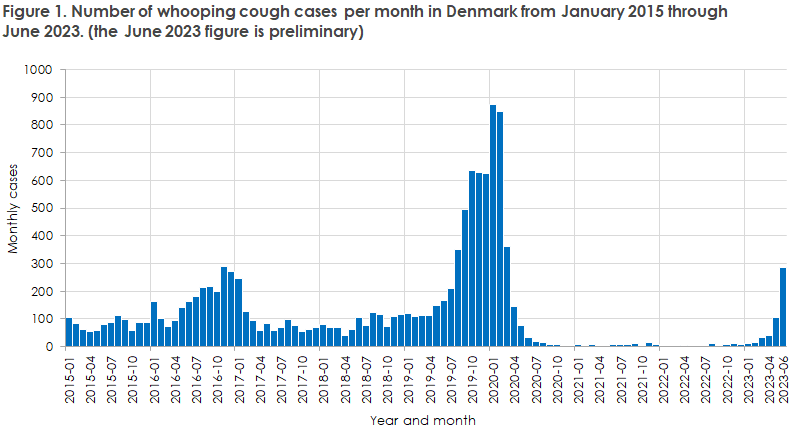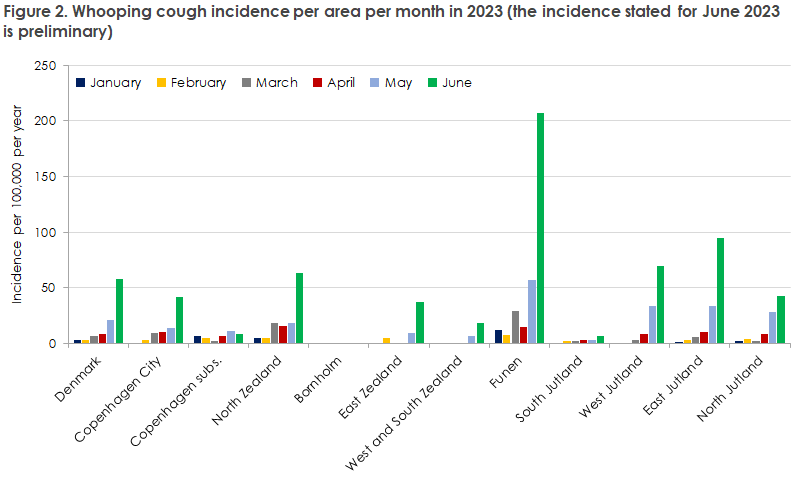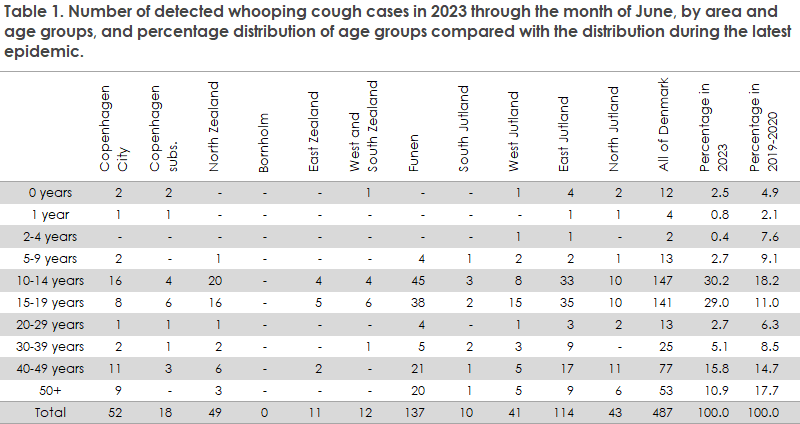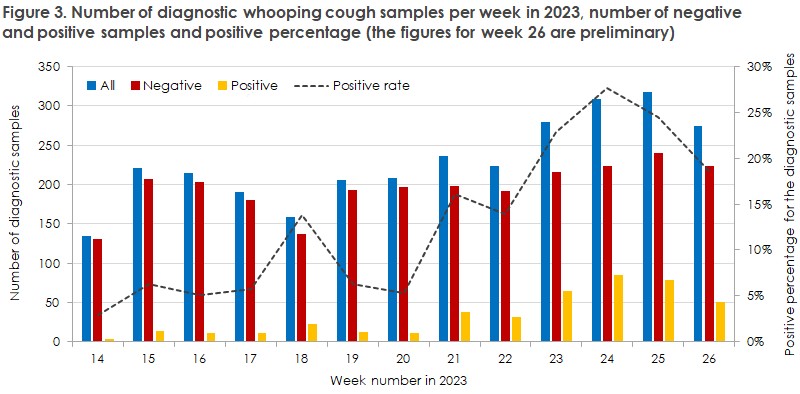No 27 - 2023
Increase in the occurrence of whooping cough
Increase in the occurrence of whooping cough
An increase was observed in the occurrence of whooping cough in Denmark in May and June 2023. The number of detected whooping cough cases per month is normally below 80-100, but in May a total of 104 cases were detected and June recorded a minimum of 284 cases (preliminary figure). As was the case for many other airway infections, the occurrence of whooping cough was very low during and after the COVID-19 restrictions, and the current increase is therefore even more pronounced, Figure 1.

Whooping cough typically occurs cyclically with an increased occurrence every 3-5 years. The latest whooping cough epidemics in Denmark occurred in 2016-2017 and 2019-2020, Figure 1 and EPI-NEWS 46/2016 and EPI-NEWS 38/2019, and an increase in the number of cases is therefore not unusual. Whether the increase will resolve with time or continue increasing to reach an epidemic level cannot yet be determined - but healthcare staff should remain extra attentive to the diagnosis in adults and children alike.
For more information about the condition and guidelines on whooping cough diagnosis, please see the Disease Encyclopaedia at the SSI website (in Danish). For guidelines on post-exposure prevention (PEP), please see the SSI website.
The increase in the number of whooping cough cases was observed in most areas (measured by residential address), but the increase is particularly notable on the island of Funen, Figure 2.

The age distribution displays a preponderance of young people aged 10-19 years, and this trend applies across Denmark, Table 1.

This preponderance is normal, but the share is currently larger than during the 2019-2020 epidemic. Whooping cough vaccination forms part of the childhood vaccination programme at three, five and 12 months of age and at five years of age. Protection is assessed to persist for 5-10 years, and protection is therefore expectedly low among youth. However, whooping cough is particularly serious in infants, which is the reason why the vaccination programme focuses on protecting this age group.
Among children below two years of age, a total of 16 cases have been recorded until the end of June, including 12 cases below one year of age. Among the 16 children, seven were unvaccinated, three had received one vaccine, four had received two vaccines and two had received three vaccines. The more vaccines the child has received, the better its protection, and the higher the likelihood that the child will experience a milder course if infected.
In June, one death was reported with whooping cough in a prematurely born infant aged two months of age, see below. Deaths due to whooping cough are rare in Denmark; the most recent previous report is from 2010, EPI-NEWS 42-43/2011.
When studying the data from the laboratories that diagnose whooping cough, it is clear that the positive percentage for diagnostic samples for detection of whooping cough is rising. From a positive percentage below 5% through week 14/2023, the value has increased to more than 18% as from week 23, Figure 3.

Currently, the number of samples tested has increased only slightly, and the increased whooping cough occurrence can therefore not be explained by increased testing, etc.
During the 2019-2020 whooping cough epidemic, a temporary vaccination programme was introduced targeting whooping cough in pregnant women. This offer expired at the end of March 2023.
The Danish Health Authority has completed a thorough assessment of the benefits and drawbacks of the vaccination programme and has recommended to the Ministry of the Interior and Health of Denmark (MIHD) that a permanent vaccination offer is introduced for pregnant women.
Therefore, the Danish government aims to provide financing for such a programme as from 2024. Financing will also form part of the upcoming proposal for the public finance act for 2024.
Additionally, the MIHD is currently making efforts to ensure financing and purchase of vaccines allowing the offer to be re-introduced already as from the late summer of 2023.
(T. Dalby, P.H. Andersen, Department of Infectious Disease Epidemiology & Prevention)
Fatal case of whooping cough in a premature infant
A premature infant, with a gestational age of 30+2 and a birth weight of 1,100 gram, was readmitted at nine weeks of age from an early stay at home due to affected respiration. The child was born by acute Caesarean section due to haemorrhage, and the mother had therefore not received steroids to mature the infant’s lungs.
The infant had neonatal asphyxia and respiratory distress, which required treatment with surfactant and artificial respiratory support for 1 day and subsequently CPAP and Highflow until the age of five weeks. The child was discharged at seven weeks of age with a probe for early home stay. The infant weighed 2.4 kg at readmission. Earlier in the admission day, the infant had developed respiratory difficulty and at that point, the infant had recessions and tachypnoea but was afebrile.
Paraclinical details: Respiratory acidosis, CRP 9. A sibling aged 4 years had been coughing for a week. The infant was stabilised in nCPAP, and the airway virus CPR panel was negative. During the second day of admission, the infant was swabbed for Bordetella pertussis. During the following two days, the infant’s condition deteriorated with fluid retention, respiratory insufficiency with severe pulmonary hypertension and circulatory failure. A thorax x-ray showed extensive bilateral infiltrates, CRP 88, leucocytes 99. A whooping cough swab (PCR) tested positive. The infant passed away after four days of admission despite ECMO treatment.
This case illustrates that whooping cough is an important differential diagnosis on suspicion of airway infection in infants, even without coughing. Marked leukocytosis is a predictor of more serious disease, and exchange transfusion may be used. The mother had not received whooping cough vaccination as the temporary vaccination programme for pregnant women had expired. However, effective transfer of vaccination antibodies is expected only from around gestational week 30 why very premature infants cannot be expected to have achieved optimal protection despite maternal whooping cough vaccination during the current pregnancy.
(M. Simonsgaard, L.S Schmidt, Paediatric Department, Herlev Hospital)
5 July 2023